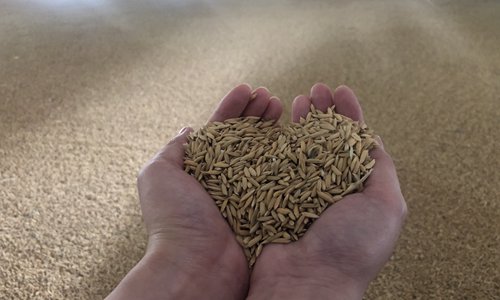HOME >> BUSINESS
China gears up to guarantee food security via information technology
By Huang Ge in Hefei Source:Global Times Published: 2019/10/16 21:38:40

Rice storage at the Anhui Modern Food Logistics Center Warehouse in Hefei, capital of East China's Anhui Province, on Wednesday Photo: Huang Ge/GT
Local governments in China have strengthened efforts to employ information technology to advance modern food industry management, aiming to further guarantee the country's food security, officials and industry representatives told the Global Times on Wednesday.
China has significantly enhanced its ability to guarantee food security over the past 70 years, being able to feed 20 percent of the global population with 9 percent of the cultivated land and 6 percent of the fresh water in the world, Zhang Wufeng, head of the National Food and Strategic Reserves Administration (NFSRA), told a World Food Day event held in Hefei, capital of East China's Anhui Province, on Wednesday.
This has made the Chinese dream of having enough food come true, and has also made a large contribution to the world, Zhang noted.
"With the deepening of structural supply-side reform and the implementation of a rural vitalization strategy, we are confident that China will have a strong, upgraded, innovative and sustainable food industry," said Vincent Martin, representative of the Food and Agriculture Organization of the United Nations (FAO) in China.
"This will not only greatly benefit the Chinese people, but will also greatly contribute to global food and nutrition security," Martin said.
The country has been strengthening efforts to advance informationization in the modern grain industry.
During the early years of the People's Republic of China, there were only 3 billion kilograms of grain storage in the country. At that time, China's food security was heavily threatened by grain loss from worms, mildew, mice and sparrows.
"Under such conditions, our employees worked from dawn to dusk every day fixing warehouses, with the aim that we would rather sweat a thousand drops than spoil a piece of grain," said Yang Chunhua, former vice director of Yutian granary, North China's Hebei Province.
Thanks to continuous efforts, the then small grain depot with a storage capacity of 2,000 tons has become a modern large grain warehouse integrating collection, storage, transportation and operation. The food security rate of the granary has now reached 100 percent.
Through the use of information technology, the efficiency of grain input, storage and management has been greatly improved, Dong Zengyu, director of Anhui Modern Food Logistics Center Warehouse, told the Global Times on Wednesday.
Daily grain storage input in the warehouse, which is located in Hefei, was 2,200 tons in 2013 and the amount increased to 5,800 tons in 2019 thanks to efforts starting in 2012 to build a digital grain deposit system, Dong said.
The warehouse, which was established in 2009, is the largest separate grain warehouse in terms of storage capacity in the province, storing wheat, rice and edible oil. Its total storage capacity is now around 311,600 tons.
"We also employ drones to supervise roof conditions when the warehouse is covered by snow in winter," Dong said.
China is at its best period in history in terms of food security thanks to high grain output, abundant stocks and stable market supply and prices, said Zhang, head of the NFSRA, at a press conference in Beijing on Monday, when the country released a white paper on food security.
The national grain output has remained stable at above 650 million tons since 2015 and the overall storage capacity of standard grain warehouses exceeded 670 million tons in 2018, according to the white paper.
The FAO designated October 16 as World Food Day in 1979. The day, which falls on Wednesday this year, has been celebrated annually since 1981.
The theme for this year's food security activity in China is "shouldering the food security responsibility and building a nation with a strong food industry."
Posted in: INDUSTRIES,MARKETS